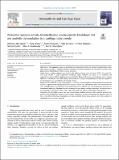| dc.contributor.author | Black, Rebecca Mae | |
| dc.contributor.author | Wang, Yang | |
| dc.contributor.author | Struglics, André | |
| dc.contributor.author | Lorenzo, Pilar | |
| dc.contributor.author | Tillgren, Viveka | |
| dc.contributor.author | Rydén, Martin | |
| dc.contributor.author | Grodzinsky, Alan J | |
| dc.contributor.author | Önnerfjord, Patrik | |
| dc.date.accessioned | 2022-01-18T20:40:31Z | |
| dc.date.available | 2021-10-27T19:53:20Z | |
| dc.date.available | 2022-01-18T20:40:31Z | |
| dc.date.issued | 2020-12 | |
| dc.date.submitted | 2020-04 | |
| dc.identifier.issn | 2665-9131 | |
| dc.identifier.uri | https://hdl.handle.net/1721.1/133524.2 | |
| dc.description.abstract | Objectives: In this exploratory study, we used discovery proteomics to follow the release of proteins from bovine knee articular cartilage in response to mechanical injury and cytokine treatment. We also studied the effect of the glucocorticoid Dexamethasone (Dex) on these responses. Design: Bovine cartilage explants were treated with either cytokines alone (10 ng/ml TNFα, 20 ng/ml IL-6, 100 ng/ml sIL-6R), a single compressive mechanical injury, cytokines and injury, or no treatment, and cultured in serum-free DMEM supplemented with 1% ITS for 22 days. All samples were incubated with or without addition of 100 nM Dex. Mass spectrometry and western blot analyses were performed on medium samples for the identification and quantification of released proteins. Results: We identified 500 unique proteins present in all three biological replicates. Many proteins involved in the catabolic response of cartilage degradation had increased release after inflammatory stress. Dex rescued many of these catabolic effects. The release of some proteins involved in anabolic and chondroprotective processes was inconsistent, indicating differential effects on processes that may protect cartilage from injury. Dex restored only a small fraction of these to the control state, while others had their effects exacerbated by Dex exposure. Conclusions: We identified proteins that were released upon cytokine treatment which could be potential biomarkers of the inflammatory contribution to cartilage degradation. We also demonstrated the imperfect rescue of Dex on the effects of cartilage degradation, with many catabolic factors being reduced, while other anabolic or chondroprotective processes were not. | en_US |
| dc.language.iso | en | |
| dc.publisher | Elsevier BV | en_US |
| dc.relation.isversionof | http://dx.doi.org/10.1016/J.OCARTO.2020.100099 | en_US |
| dc.rights | Creative Commons Attribution 4.0 International license | en_US |
| dc.rights.uri | https://creativecommons.org/licenses/by/4.0/ | en_US |
| dc.source | Elsevier | en_US |
| dc.title | Proteomic analysis reveals dexamethasone rescues matrix breakdown but not anabolic dysregulation in a cartilage injury model | en_US |
| dc.type | Article | en_US |
| dc.contributor.department | Massachusetts Institute of Technology. Department of Biological Engineering | |
| dc.contributor.department | Massachusetts Institute of Technology. Department of Mechanical Engineering | |
| dc.contributor.department | Massachusetts Institute of Technology. Department of Electrical Engineering and Computer Science | |
| dc.relation.journal | Osteoarthritis and Cartilage Open | en_US |
| dc.eprint.version | Final published version | en_US |
| dc.type.uri | http://purl.org/eprint/type/JournalArticle | en_US |
| eprint.status | http://purl.org/eprint/status/PeerReviewed | en_US |
| dc.date.updated | 2021-09-03T14:07:03Z | |
| dspace.orderedauthors | Black, RM; Wang, Y; Struglics, A; Lorenzo, P; Tillgren, V; Rydén, M; Grodzinsky, AJ; Önnerfjord, P | en_US |
| dspace.date.submission | 2021-09-03T14:07:04Z | |
| mit.journal.volume | 2 | en_US |
| mit.journal.issue | 4 | en_US |
| mit.license | PUBLISHER_CC | |
| mit.metadata.status | Authority Work Needed | en_US |
